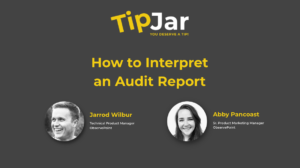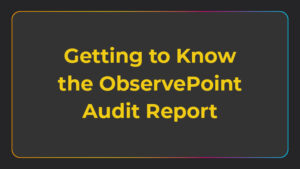What Is a Website Audit? It’s for More than SEO

Looking to audit your website? Good move. A periodic website audit can make an enormous difference in the functionality and findability of any website.
To jumpstart your search for the right solution, use the insights in this post to understand why a site audit is essential, as well as get some ideas about tools and strategies to perform your site audit.
What Is a Website Audit?
Perhaps you have an inkling of what a web audit is. It’s for SEO, right? Let me just stop you there real quick.
Search engine optimization is only part of a website audit. In its entirety, a website audit is an audit of your site’s usability, measurability, security and findability. Here’s that list again:
- Usability
- Measurability
- Privacy
- Findability
Note that findability is last on the list. This may seem to shave against the grain a bit, since you probably came to this post looking for an SEO audit tool. But a website audit goes beyond auditing for SEO, and the face of your website will be much smoother if your audit isn’t just looking for header tags and meta descriptions.
You’ll understand why soon enough, as we delve into each objective of a website audit.
Usability
A site that isn’t usable isn’t, well, usable. And if site visitors can’t use your site, then their visit may come to an abrupt, untimely end. Some of the main ways your site can break down in terms of usability include:
- Broken or missing pages
- Broken user paths (a checkout page won’t load, for example)
- Broken JavaScript or marketing technology (a technology on your site won’t load)
Any of these issues could negatively affect the usability of your site.
And beyond visitor usability, you might have a key technical element on your site that if it failed could cost you a lot of money or attention.
For example, if you are a media company, what would happen if your ad-serving technology went down? Or if your company relies heavily on social shares and your social buttons won’t load? I shudder at the thought.
Thankfully, if you can catch these usability errors with a periodic website audit, you will be able to avoid upsetting your customers who came looking but found you lacking.
Measurability
Measurability refers to your ability to accurately measure user behavior on your site. To be more clear, we’re talking web analytics.
Web analytics are profoundly important in an ever-evolving, digitally dependent world. More likely than not, your customers will engage with you digitally before any sort of in-person interaction. Using web analytics to measure user behavior can help you better understand your customers and help you make decisions based on that data.
Because decisions based on web analytics data are so important, you need to protect the quality of your data tooth and nail. Data quality can linger as a consequence of increasing site complexity and the following technical issues:
- Data inflation (Analytics tracking tags installed twice on one page = doubled data)
- Data loss (Analytics tracking tags not installed on a page = no data)
And that’s just the tip of the iceberg. Companies that use robust, enterprise-grade analytics solutions face special challenges (like governing a library of custom variables, to name one example. eVar5, anyone?).
A website audit tool is a perfect complement to your web analytics strategy, making sure your analytics tags and variables are always collecting accurate, actionable data. You can be confident in making decisions on high-quality data. Learn more about why you should audit your web analytics.
Privacy
Site privacy is an important piece of your website data strategy, for a couple reasons:
- Consumers value the protection of their personal data.
- Data privacy regulators can fine you for infringement of data privacy rights.
With the impending arrival of the General Data Protection Regulation (GDPR), it’s more important than ever to ensure you’re protecting consumer data. A website audit can help you do just that.
Some of the data privacy threats your website might face include:
Unauthorized piggybacking tags
Piggybacking tags are technologies that you haven’t installed directly onto your site, but that are summoned by another tag you didn’t install. These tags may be harmless, but maybe not—regardless, you will want to know about them.
Improper use of personal data
Sending consumer data in a way that is insecure, unauthorized or just plain seedy can put you in a mess of trouble. Data privacy regulators will throw the book at you if you’re putting your consumers’ data at risk. A site auditor can recognize patterns of personally identifiable information (PII) and warn you of any data privacy infringements.
Dysfunctional security tags
Security tags are like other web tags—they’re small pieces of code you install on your site from your security vendor (such as the McAfee SECURE tag). These tags can help protect your site from phishing attempts and other malicious attacks. If for some reason these tags go down, you’ll want to know about it as soon as possible.
Robust web audit tools can show you when and where these tags fire so you can stay in the know of your website’s privacy.
Findability
You probably came looking for a website audit tool because you wanted to perform an SEO website audit. Making sure your website is optimized for search engines is important, since they are a huge acquisition channel for many companies (the number of daily searches on Google is roughly 3.5 billion per day).
A website audit tool that checks for SEO best practices will look for the following page attributes, amongst others:
- Header tags – Missing, duplicate, over 70 characters, multiple
- File sizes
- Page load times
- Meta descriptions
- Anchor text
- And more
By using a website audit tool, you can analyze a large volume of pages to see how they hold up against principles of search engine optimization.
But remember, a true-blue website audit goes beyond just auditing for SEO—certainly the goal of your website is more than just being found.
Your mission is much greater!
So even if finding a website SEO checker is currently your first priority, don’t stop there. Beyond using a site audit to test for SEO, use a site audit tool to test your website for usability, measurability, privacy and findability.
Choosing a Website Audit Tool
The best size and extent of your website audits will depend on the maturity of your website design, the size of your website and the website’s tagging architecture. If your website is relatively small and young, you may be more concerned with findability over security, or usability over measurability. Not that one is more important than the other, but priorities evolve, and so should you. Here are a few technology solutions to consider for your website audit tool of choice.
ObservePoint Web Governance Platform
ObservePoint’s Web Governance Platform, gives you a full range of website auditing capability with a high level of customizability. For large enterprises interested in auditing large websites with a full library of analytics variables, ObservePoint's scanner can meet that need.
What can ObservePoint audit?
- Usability: Yes
- Measurability: Yes
- Privacy: Yes
- Findability: Yes
Main Features:
- Custom website auditing: Run scripts on your pages to test functionality and SEO
- Tag auditing: Test that your analytics and marketing tags are present and firing
- Website monitoring: Run frequent, automated tests to check for usability
- Rules engine: Define rules to test against your web pages to ensure performance
- Site audit report: View tag presence and a data quality score
- Privacy Validation: Ensure your consent management platform is honoring consent across your entire website.
Limitations:
To get the most out of ObservePoint, users should have some knowledge of RegEx, JavaScript and website architecture. It also requires consistency of scans to ensure your are constantly monitoring all the pages, tags, and cookies across your entire website.
Screaming Frog
Screaming Frog is a web crawler used by some of the top businesses to test for SEO. The tool can also help test website usability by identifying broken pages.
What can Screaming Frog audit?
- Usability: Yes
- Measurability: Limited
- Privacy: No
- Findability: Yes
Main Features:
- Broken link finder
- Page title and metadata analysis
- Custom source code search
- Technical SEO audit information, such as redirects, internal links, protocols and site architecture
Limitations:
While Screaming Frog can identify custom source code, your website audit won’t automatically recognize what that code represents. So Screaming Frog isn’t the best tool for testing analytics and marketing tags. In addition, there is no feature to test data privacy.
SEOptimer
If you’re looking for something simple to check just a few pages, then SEOptimer is a good option. Just plug in the URL of the page you want to know about, and you’ll get a quick report with recommendations about how you can improve the page.
What can SEOptimer audit?
- Usability: Yes
- Measurability: Limited
- Privacy: Limited
- Findability: Yes
Main features:
- Quick report of site usability/performance
- Show if an analytics tool is installed on the site
Limitations:
SEOptimer lacks the large-scale crawling aspect that WebAssurance and Screaming Frog have. To test multiple pages, you have to write out a list of URLs—a tedious task. Still, the quick reports are useful if you need a quick look at a few pages.
Getting Started with Your Free Trial
Start scanning your website today with a Free ObservePoint Trial. Get access to a full account, no credit card required. Start Your Free Trial.





